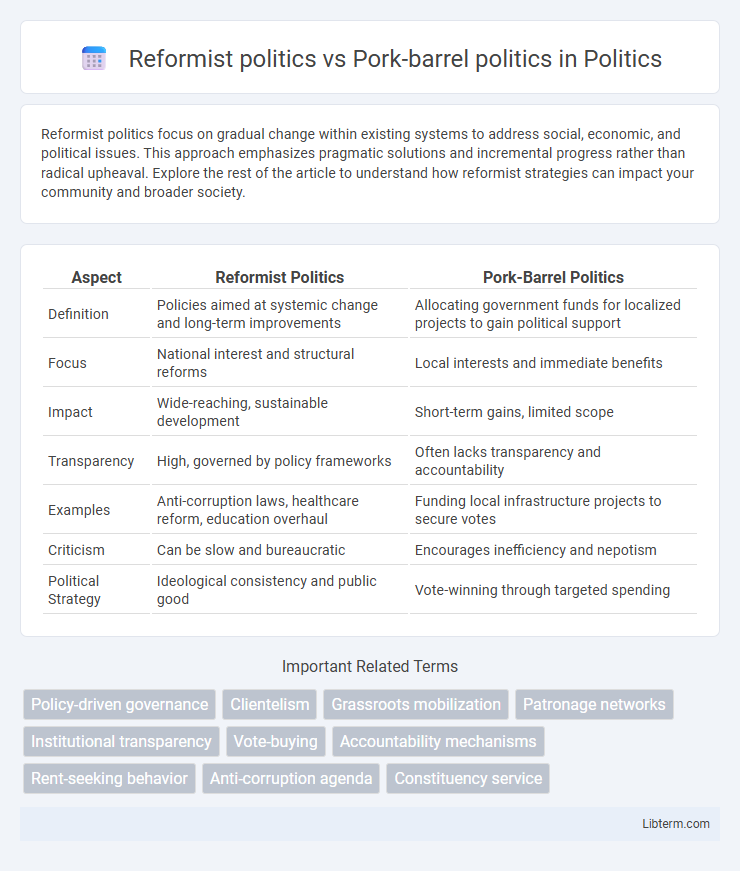Reformist politics focus on gradual change within existing systems to address social, economic, and political issues. This approach emphasizes pragmatic solutions and incremental progress rather than radical upheaval. Explore the rest of the article to understand how reformist strategies can impact your community and broader society.
Table of Comparison
| Aspect | Reformist Politics | Pork-Barrel Politics |
|---|---|---|
| Definition | Policies aimed at systemic change and long-term improvements | Allocating government funds for localized projects to gain political support |
| Focus | National interest and structural reforms | Local interests and immediate benefits |
| Impact | Wide-reaching, sustainable development | Short-term gains, limited scope |
| Transparency | High, governed by policy frameworks | Often lacks transparency and accountability |
| Examples | Anti-corruption laws, healthcare reform, education overhaul | Funding local infrastructure projects to secure votes |
| Criticism | Can be slow and bureaucratic | Encourages inefficiency and nepotism |
| Political Strategy | Ideological consistency and public good | Vote-winning through targeted spending |
Understanding Reformist Politics: A Clear Definition
Reformist politics centers on implementing systemic changes aimed at improving governance, social equity, and institutional accountability, distinguishing itself from pork-barrel politics, which prioritizes localized spending to secure political support. This approach advocates for policy-driven solutions that address root causes of societal issues rather than short-term, vote-buying expenditures. Understanding reformist politics requires recognizing its commitment to transparency, sustainable development, and long-term benefits over immediate electoral gains.
Pork-barrel Politics Explained: Origins and Practices
Pork-barrel politics originated in the United States during the early 19th century as legislators secured government funds for localized projects to benefit their constituencies, often to gain political support. This practice involves directing government spending to specific districts or regions, frequently resulting in projects that provide limited national benefit but strengthen local political influence. Critics argue pork-barrel politics fosters inefficiency and corruption, diverting resources from broader policy reforms aimed at systemic improvements.
Key Differences Between Reformist and Pork-barrel Approaches
Reformist politics emphasizes systemic changes aimed at transparency, accountability, and long-term societal benefits, often fighting corruption and promoting equitable resource distribution. Pork-barrel politics centers on localized, short-term gains by directing government funds to specific constituencies, which can foster clientelism and undermine broader policy goals. The key difference lies in reformist politics pursuing structural improvements, whereas pork-barrel politics focuses on immediate political support through targeted expenditures.
Historical Context: Reformist Movements vs. Patronage Systems
Reformist politics emerged as a response to entrenched patronage systems and pork-barrel politics that dominated governance in the 19th and 20th centuries, aiming to eradicate corruption and promote merit-based administration. Historical reform movements like the Progressive Era in the United States challenged the patronage networks supported by pork-barrel spending, advocating for transparency and accountability in public resource allocation. These efforts sought to dismantle clientelist structures that prioritized local or political loyalty over national interest and effective governance.
Impacts on Governance and Public Trust
Reformist politics promotes transparency, accountability, and long-term policy solutions, which significantly enhances governance quality and public trust. In contrast, pork-barrel politics often leads to resource misallocation and corruption, undermining institutional effectiveness and eroding citizens' confidence in government. Empirical studies link reformist approaches to improved public service delivery and higher voter satisfaction, while pork-barrel strategies correlate with increased political cynicism and governance inefficiencies.
Economic Outcomes: Reformist Policies vs. Patronage Spending
Reformist politics prioritize structural economic changes such as improving transparency, reducing corruption, and investing in sustainable development, leading to higher long-term GDP growth and increased foreign investment. Pork-barrel politics focus on patronage spending that often results in inefficient allocation of resources, budget deficits, and limited impact on broad economic development. Empirical data suggest that reformist policies produce more significant improvements in income equality, infrastructure quality, and overall economic productivity compared to short-term gains from patronage-driven expenditures.
Case Studies: Examples of Reformist and Pork-barrel Leadership
Reformist politics prioritize transparency, accountability, and structural changes as exemplified by Lee Kuan Yew's leadership in Singapore, which transformed the nation through anti-corruption measures and meritocratic governance. In contrast, pork-barrel politics often involve localized, constituency-based projects aimed at securing electoral support, seen in the Philippines under leaders using discretionary funds for personal and political gain. Case studies like Brazil's Bolsa Familia program highlight successful reformist efforts in social welfare, while India's frequent use of MLA Local Area Development Schemes illustrates the typical practices of pork-barrel politics focused on vote-buying.
Voter Perceptions and Political Accountability
Reformist politics is often perceived by voters as a commitment to transparency, efficiency, and long-term policy improvements, enhancing political accountability through clear goals and measurable progress. In contrast, pork-barrel politics tends to be viewed as short-term, clientelist, and self-serving, eroding trust and reducing accountability by focusing on localized projects that benefit specific constituencies rather than the broader public. Voter perceptions of these approaches significantly influence political legitimacy, with reform-oriented leaders typically gaining stronger support for promoting systemic change and reducing corruption.
Policy Effectiveness and Long-term Social Benefits
Reformist politics prioritize evidence-based policymaking and systemic changes that enhance policy effectiveness by addressing root causes of social issues, leading to sustainable long-term benefits. Pork-barrel politics often focus on localized, short-term projects that may secure immediate political support but hinder efficient resource allocation and fail to produce broad, lasting social improvements. Consequently, reformist approaches drive comprehensive development, while pork-barrel strategies can perpetuate inefficiencies and social disparities.
The Future of Political Systems: Toward Reform or Patronage?
Reformist politics prioritize transparency, accountability, and institutional modernization to create sustainable governance, contrasting with pork-barrel politics driven by localized patronage and short-term electoral gains. The future of political systems hinges on balancing these approaches, with digital governance and civic engagement tools enhancing reformist efforts while entrenched patronage networks resist change. Emerging democracies face critical challenges in overcoming clientelism to foster inclusive political development and equitable resource distribution.
Reformist politics Infographic

 libterm.com
libterm.com